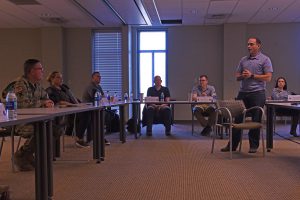By Sgt. Garrett L. Dipuma, Louisiana National Guard Public Affairs Office
NEW ORLEANS – Over the last nine months, the Louisiana National Guard and the National Guard Bureau have worked together to implement the Lean Six Sigma program to reduce waste and increase readiness across the entire National Guard.
LSS is a scientific method used for identifying waste and driving out variation in business processes.
“Lean Six Sigma is a tool that covers all spectrums of our business enterprise,” said Col. Greg Parker, the LANG director of strategic plans. “Look at it this way, the more time we can save on administrative stuff, the less time that Soldiers and Airmen have to stand in line and the more time they have to train for the war fight.”
The move to implement the program was prompted by Secretary of Defense Jim Mattis’ call for Department of Defense business reforms. In an official memorandum, Mattis called on DoD personnel to focus on sev eral points including budget discipline and effective resource management.
eral points including budget discipline and effective resource management.
There are three levels of certifications in LSS, classified by belt color: yellow, green and black. After the black belt certification, there is an additional master black belt level. Earning a black belt certification in LSS shows that an individual can look at an existing program and introduce new practices to make that program more efficient.
To become a certified black belt, an LSS student must submit a project that he or she is working on within their organization that shows a real waste reduction. This allows the organization the added benefit of immediately reaping the results of the training program.
“Our most precious resource is time. We use LSS tools to identify areas where we can streamline a process to make it faster without reducing efficiency,” said Sgt. Maj. David Mula, the LANG’s strategic plans senior enlisted advisor. “The goal is always to increase readiness and save time.”
Mula said that Louisiana was the first state to begin LSS training with NGB, and that the LANG is working with NGB’s Business Transformation Office to pass along lessons learned as they move through the process for when other states go through the training.
“For example, as the first state to conduct a project identification workshop, we had to identify what we thought we needed,” said Mula. “Once our first workshop was co mpleted, Mr. Chris Biggs [a master black belt LSS trainer] was able to adjust our next workshop so that it was shorter and more effective, which is exactly what the program is designed to do.”
mpleted, Mr. Chris Biggs [a master black belt LSS trainer] was able to adjust our next workshop so that it was shorter and more effective, which is exactly what the program is designed to do.”
The LANG has done more than make training shorter using the LSS approach. Mula’s project that certified him as a black belt saves the LANG over 500 man-hours and $370,000 in labor costs annually in meetings alone.
Lt. Col. Keith Robinson, the LANG state training officer, submitted a plan that has this year increased the LANG’s dental readiness by 30%.
Other programs that are being studied include making vehicle and installation maintenance more efficient. The LANG currently has 21 Guardsmen that are training to become LSS certified.
“We have a lot of room to improve our process, where things can get built faster or more efficiently with less money,” said 1st Lt. Scott Mucci, the LANG’s military construction manager. “That can be a huge improvement for the National Guard as far as keeping our force and our facilities up to date.”
“The best practices that we find in these programs can be used in other states with minimal changes, said Mula. “We’ve had a lot of constrained financial environments over the last few years, so doing as much as we can with the limited resources we have is important. Every dollar we spend is a taxpayer dollar, and it’s our job to safeguard those and to use taxpayer money to the greatest benefit possible.”






